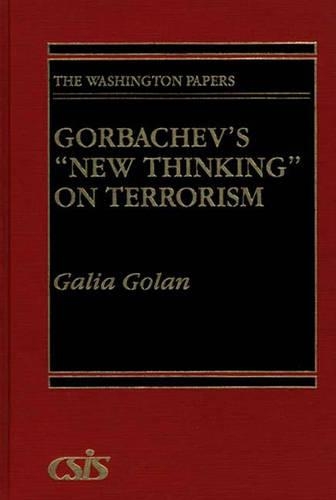
Gorbachev's New Thinking on Terrorism
(Hardback)
Available Formats
Publishing Details
Gorbachev's New Thinking on Terrorism
By (Author) Galia Golan
Bloomsbury Publishing PLC
Praeger Publishers Inc
19th January 1990
United States
Classifications
Tertiary Education
Non Fiction
Central / national / federal government policies
Terrorism, armed struggle
363.320947
Physical Properties
Hardback
134
Description
Galia Golan's concise but richly detailed monograph gives us the first look at Soviet policy toward terrorism under Gorbachev. Drawing on a wide array of Soviet sources, Dr. Golan traces the evolution in Soviet attitudes toward terrorism and support for movements of national liberation from Brezhnev to Gorbachev. She focuses specifically on the change in Soviet public positions toward a more explicit condemnation of terrorist acts. The debate is likely to continue over whether changing public positions reflect an actual shift in Soviet behavior, but Golan's book helps to frame that debate. All those who are interested in evaluating Soviet `new thinking' on an important global and regional issue should read this book. Dennis B. Ross Director, Policy Planning Staff U.S. Department of State This book examines the reevaluation of Soviet foreign policy under Gorbachev, known as the new thinking. This new foreign policy has produced a new Soviet attitude and, apparently, different behavior toward terrorism. In the past, terrorism was officially condemned either as a method employed by imperialist or capitalist regimes against an oppressed population or as an illegitimate offshoot of armed struggle, having nothing in common with genuine liberation struggles. Under Gorbachev, there is a reduction in Soviet aid to many groups using terrorism and a call for political solutions to ongoing conflicts. The latest volume in The Washington Papers series, Gorbachev's New Thinking on Terrorism will be of special interest to political scientists, Soviet specialists, or anyone interested in terrorism today. With a foreword by Walter laqueur Laqueur, this book begins with a detailed background study of Soviet attitudes toward terrorism, demonstrating the changes in Gorbachev's approach to the problem. Galia Golan, Darwin professor of Soviet and East European Studies at the Hebrew University of Jerusalem, defines the differences between Gorbachev's rhetoric and the reality of the new thinking as the book explores reports and rumors of Soviet involvement in Pakistan and the Philippines. The book concludes with a look at current Soviet policy toward terrorist groups traditionally backed by the Soviet Union.
Reviews
"Galia Golan's concise but richly detailed monograph gives us the first look at Soviet policy toward terrorism under Gorbachev. Drawing on a wide array of Soviet sources, Dr. Golan traces the evolution in Soviet attitudes toward terrorism and support for movements of national liberation from Brezhnev to Gorbachev. She focuses specifically on the change in Soviet public positions toward a more explicit condemnation of terrorist acts. The debate is likely to continue over wheteher changing public positions reflect an actual shift in Soviet behavior, but Golan's book helps to frame that debate. All those who are interested in evaluating Soviet new thinking' on an important global and regional issue should read this book."-Dennis B. Ross Director, Policy Planning Staff U.S. Department of State
"This survey demonstrates that Gorbachev has had a marked effect on the Soviet approach to terrorism. It also demonstrates that support for terrorists has not yet been abandoned, though it has in several striking cases been reduced. Gorbachev has been as tough as any predecessor in dealing with terrorists who threaten Soviet citizens and interests. Galia Golan provides the reader with useful points to watch in the future."-Paul B. Henze RAND Corporation Author of The Plot to Kill the Pope
Author Bio
GALIA GOLAN is the Jay and Leoni Darwin Professor of Soviet and East European Studies and Chairperson of the Department of Political Science at the Hebrew University of Jerusalem. She is former director of the Mayrock Center for Soviet and East European Studies at the Hebrew University.
